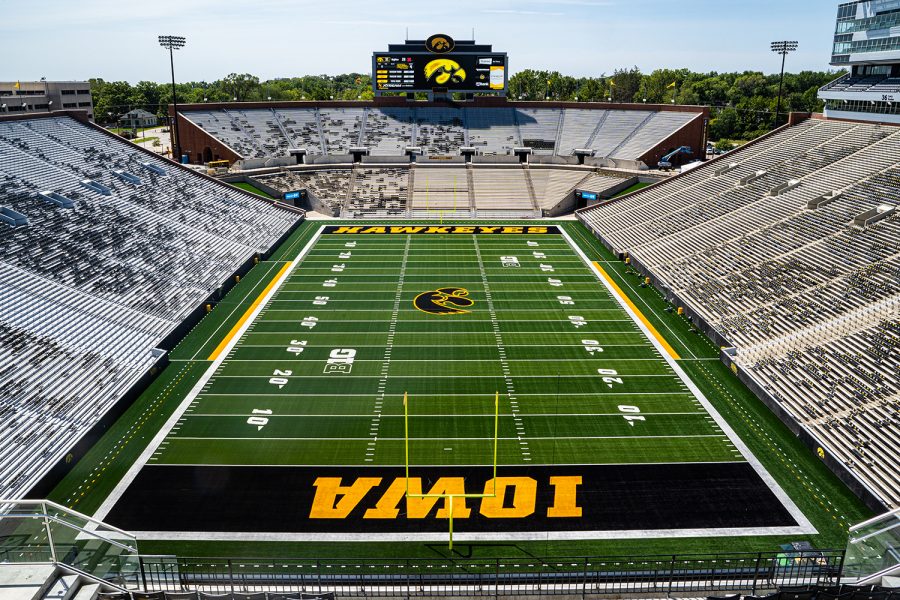Opinion: Iowa should follow California’s lead on college-athlete compensation
A new law in California allows student athletes to profit off of their likenesses, a move that should be emulated in the Hawkeye State.
Kinnick Stadium is seen fom the north end zone at Iowa Football Media Day on Friday, August 9, 2019.
October 14, 2019
One state is finally trying to compensate college athletes beyond scholarship.
California Gov. Gavin Newsom signed the Fair Pay to Play Act Sept. 30. It’s an excellent piece of legislation that will allow any college athlete to profit from their own name, image, or likeness. As a conservative, this is probably the first and last time I’ll ever praise the ultra-progressive Newsom, but good policy is good policy no matter who it comes from.
Although the bill doesn’t take effect until 2023, it’s an important step in the right direction. Newsom set the national conversation about college athletics on fire with broad support across the political spectrum. Similar bills are being discussed by lawmakers in several other states, and Iowa should join them.
Without the hard work of Hawkeye student athletes, the University of Iowa would have a difficult time selling $51 Kinnick Stadium tickets and $67 hoodies. In the Hawkeye State, only six state employees had 2018 incomes over $1 million, according, according to the Des Moines Register state salary database. The top four included the football and basketball coaches at Iowa and Iowa State, respectively.
The new California bill does not require schools to pay athletes, nor should it. I’m not advocating for some socialist revolution and redistributing all profits equally among all student athletes. Ferentz is an exceptional coach and he deserves every penny of his $4.5 million salary.
Ferentz’s players work just as hard as he does. If they want to earn extra money signing autographs at the Coral Ridge Mall, appearing on cereal boxes, or running youth football camps in the off-season, they should be at liberty to do so. Many student athletes come from poor families. The remittances of college players would alleviate poverty and stimulate the local economies of impoverished communities.
The NCAA earned $1.1 billion in revenue in 2018. Of that, student athletes received precisely $0 in direct compensation. NCAA President Mark Emmert netted $2.9 million in 2017.
“If a student athlete writes a book or produces a song, the rules today say that’s (not allowed). We have been routinely allowing them to receive compensations that are unrelated to sport,” Emmert told the Indianapolis Star.
Herein lies the problem. Hawkeye football players Nate Stanley and A.J. Epenesa are talented guys, but I’m not holding my breath for either one to drop a country music album or a book on interior design. Any marketable product or service they have to offer would almost definitely be football-related.
Emmert likened the California law to a total elimination of rules and worried about “unfettered licensing.” But he’s not smarter or wiser than state lawmakers and individual college administrators. They are capable of overseeing and regulating endorsements without his omnipotent guidance. I doubt that officials in Sacramento, arguably the most regulation-happy group in the country, will allow anything close to unfettered licensing.
Right now, the NCAA runs an unaccountable bureaucracy that despotically reigns over more than 1,200 collegiate-sports programs, and it exceeds the legitimacy of its role by perpetuating arcane rules that prohibit student athletes from becoming entrepreneurs.
California lawmakers took a brave stand for the economic freedom of college athletes. Their counterparts in Des Moines should follow them.
Columns reflect the opinions of the authors and are not necessarily those of the Editorial Board, The Daily Iowan, or other organizations in which the author may be involved.



